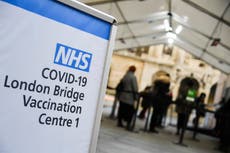Covid: England’s deputy chief medical officer defends plan to delay vaccine second doses to accelerate rollout
Senior adviser says patients get ‘almost complete protection’ from first dose of Pfizer jab
Your support helps us to tell the story
From reproductive rights to climate change to Big Tech, The Independent is on the ground when the story is developing. Whether it's investigating the financials of Elon Musk's pro-Trump PAC or producing our latest documentary, 'The A Word', which shines a light on the American women fighting for reproductive rights, we know how important it is to parse out the facts from the messaging.
At such a critical moment in US history, we need reporters on the ground. Your donation allows us to keep sending journalists to speak to both sides of the story.
The Independent is trusted by Americans across the entire political spectrum. And unlike many other quality news outlets, we choose not to lock Americans out of our reporting and analysis with paywalls. We believe quality journalism should be available to everyone, paid for by those who can afford it.
Your support makes all the difference.England’s deputy chief medical officer has defended a controversial policy to delay giving second doses of coronavirus vaccines in order to give more first jabs to vulnerable people.
Professor Jonathan Van-Tam, who advised the government’s vaccine taskforce, argued that data showed patients got “almost complete protection” from their first dose of the Pfizer/BioNTech vaccine and could wait for their second jab.
Second doses of the Pfizer vaccine will now take place within 12 weeks of the first jab rather than within the 21 days recommended by the manufacturer, with a similar policy of delaying the second jab applying to the recently-approved Oxford/AstraZeneca vaccine.
Professor Van-Tam’s defence of the policy came as the NHS prepared to roll out the Oxford vaccine on Monday, with some 530,000 doses set to be available in the coming days.
Writing for The Mail on Sunday, he said analysis from the independent Joint Committee on Vaccination and Immunisation (JCVI) showed the Pfizer/BioNTech vaccine was 89 per cent effective against Covid-19 in the period of 15 to 21 days after the first dose.
The medical officer argued that it appeared unlikely that such protection would decline severely in the 12 weeks after the jab.
“The evidence clearly shows vaccinated individuals get almost complete protection after the first dose,” Professor Van-Tam said.
“Simply put, every time we vaccinate someone a second time, we are not vaccinating someone else for the first time.
“It means we are missing an opportunity to greatly reduce the chances of the most vulnerable people getting severely ill from Covid-19.”
He added: “If a family has two elderly grandparents and there are two vaccines available, it is better to give both 89 per cent than to give one 95 per cent protection with two quick doses, and the other grandparent no protection at all.”
The plan to delay second doses was criticised on Thursday by the British Medical Association (BMA), which said it was “unreasonable and totally unfair” to ask healthcare workers to reschedule appointments already in place.
It also warned that the plan would cause “huge logistical problems” for GPs and vaccination centres with rebooking appointments for elderly or vulnerable patients.


Join our commenting forum
Join thought-provoking conversations, follow other Independent readers and see their replies
Comments